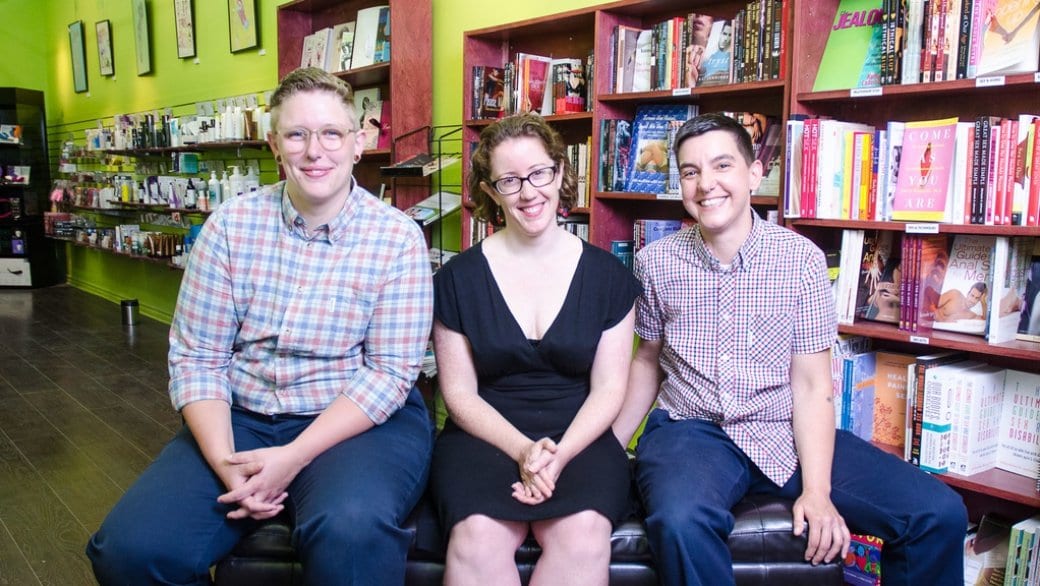Toronto sex shop Come As You Are (CAYA) has launched a new, safe-for-work website in an effort to make it easier for transgender youth to get the gender-related gear they need.
The CAYA co-op closed the doors of its Queen Street West location on Aug 28, 2016, because of high rent and the costs associated with being an independent business in the city, but continues to serve the community online through comeasyouare.com. The business, the majority of whose worker-owners have been transgender or gender-variant, has been queer-positive since its inception in 1997.
The same month that the physical location closed, CAYA’s owners soft launched an additional site, gendergear.ca.
For much of its nearly 20 years in business, CAYA has been the go-to in Toronto for many trans folks looking for gender-related items — chest binders, packers, gaffs, stand-to-pee devices, books and more. Now, its new website comes as a way to better serve the increasingly youthful trans community.
“For us, 10 or 15 years ago most trans guys that I knew were in their 20s or 30s,” says Jack Lamon, one of the co-op’s worker-owners. “But now what we’re finding is kids are coming out as gender variant or trans at much earlier ages.”
Lamon says that CAYA has seen more parents shopping for their kids, and more service providers — counsellors and social workers — enquiring about items for their younger clients who are transitioning.
“So, there’s sort of two issues,” he says. “First, because [Come As You Are] is an adult website, it’s blocked by firewalls for a lot of institutions.” He says this can be an obstacle for these service providers.
The other concern relates to consent. Lamon says that a parent might be sexually conservative, but gender positive — in other words, some parents might be willing to shop for gender-related items for their kids, but don’t want to have to wade through a sea of dildos, strap-ons, cuffs and other sex toys first.
Gendergear is also safe for work. It includes all of the gender-related items that Come As You Are has, but none of the sex toys. The hope is that it won’t deter sensitive parents or trigger office firewalls, allowing more trans youth to get the items they need for their transitions.
“Choice and opportunity are big things for us,” says Noah Kloeze, another of CAYA’s worker-owners. “Not feeling okay to explore gender or sexuality is the thing that we actively work to avoid. And it felt we were — due to our status as an adult business — creating that same discomfort that we hustled really hard to try to dismantle.”
Cathy Maser is a nurse practitioner working with the Transgender Youth Clinic at Sick Kids Hospital. The clinic, created in 2013, provides medical care and support to transgender youth between the ages of 12 and 17.
Since the clinic’s creation, Maser has been referring parents to CAYA. She says that while she sometimes has to look up gender-related items on more adult-oriented sites like Come As You Are, she has never had an issue with firewalls.
“Because I work in adolescent medicine, I have to go onto websites that have [sexual] content because I need to know what’s good and bad as far as educating my patients,” she says. “So I haven’t had issues with the sites being blocked with the computer in my office.”
However, based on her experience working with parents, she thinks Gendergear will be easier for less sex-positive parents to handle. Maser plans to start regularly referring parents to Gendergear.
“I think it’s definitely more accessible for parents” she says. “And more informative, because it has [information] about binders and how to measure yourself, different sorts of things as well, and stand-to-pee devices and that sort of thing.”
Another plus for trans youth is that CAYA’s popular binder recycling program didn’t end with the closure of the Queen Street location — it is being preserved online. The program, which Lamon describes as “one of the best things we did,” allows folks to buy previously-owned binders for $5 each (the cost is normally about $50).
“There are other businesses on the internet that sell trans products, and we think the more options the better,” Lamon says. “And the reality is, for trans people there aren’t a lot of options, so it’s nice that we can provide one.”


 Why you can trust Xtra
Why you can trust Xtra


